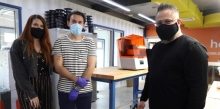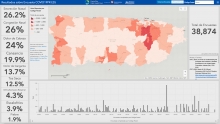Charla científicos al servicio en línea: Uniendo puentes en las ciencias (2023)
En esta charla, la Dra. Greisha Ortiz Hernández, investigadora traslacional, hablará de su experiencia en el laboratorio, sus colaboraciones y la interacción con la comunidad. El núcleo de su charla será sobre su trabajo investigativo con el cáncer de próstata en grupos minoritarios.










